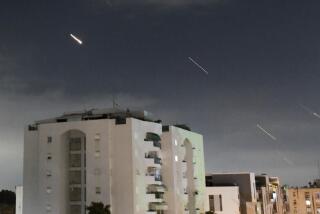Bush tries to rally opposition to Iran
ABU DHABI, UNITED ARAB EMIRATES — President Bush on Sunday called Iran “the world’s leading state sponsor of terror” and sought to shore up opposition to the government in Tehran throughout the Middle East.
But even as he criticized Iranian leaders, saying they were seeking to repress their citizens and cow neighboring countries, Bush appealed to U.S. allies in the region to open up their own political and economic systems to greater democracy.
Spotlighting a swath of the globe where U.S. diplomacy is built around seeking help for the administration’s anti-terrorism effort, the president criticized only Iran by name. He avoided mentioning Egypt, his final stop on a six-nation Middle East trip, despite its long record of human rights abuses, limited political rights and economic disparity. Nor did he cite other nations across the region with similarly troubled histories.
Speaking just 150 miles across the Persian Gulf from Iran, Bush said the Islamic Republic “sends hundreds of millions of dollars to extremists around the world, while its own people face repression and economic hardship at home.” He said that Iran was seeking “to intimidate its neighbors with ballistic missiles and bellicose rhetoric.”
In Tehran, Foreign Ministry spokesman Mohammed Ali Hosseini dismissed Bush’s approach to Iran as ineffective.
“During the past seven years, the Bush administration has followed a policy to isolate Iran and promote Iranophobia in the region,” Hosseini said, according the official Islamic Republic News Agency. “All regional states adopted a vigilant approach regarding that policy and opposed it.”
Bush’s criticism of Tehran occurred as the International Atomic Energy Agency in Vienna reported that Iranian representatives had promised to answer key questions within a month about their nation’s past covert nuclear activities. Tehran also provided information about its effort to develop an advanced centrifuge that would enrich uranium much more quickly and efficiently than a model it now uses, the United Nations’ nuclear watchdog agency said.
Bush made only brief reference to alleged Iranian efforts to develop a nuclear weapon, which an administration intelligence report recently said had been halted in 2003, and did not mention the announcement in Vienna.
Gordon D. Johndroe, spokesman for the National Security Council, said in Abu Dhabi of Iranian officials: “Answering questions about their past nuclear activities is a step, but they still need to suspend their enrichment and reprocessing activity. Another declaration is no substitute for complying with the U.N. sanctions.”
Bush spoke here to an audience of government officials, business executives, academics and students assembled by the Emirates Center for Strategic Studies and Research, a think tank. Delivering an otherwise gingerly worded address intended to revive a quiescent campaign for broader democracy across the Middle East, he called for reforms that would transform life from Morocco to Pakistan.
Using the language of a middle-school civics lesson, Bush proclaimed a “new era,” which he said was “founded on the equality of all people before God.”
It is built, he said, “with the understanding that power is a trust that must be exercised with the consent of the governed -- and deliver equal justice under the law.”
“For decades, the people of this region saw their desire for liberty and justice denied at home and dismissed abroad in the name of stability,” the president said. “Today your aspirations are threatened by violent extremists who murder the innocent in pursuit of power.”
The president spoke in an opulent auditorium of the $3-billion Emirates Palace Hotel in Abu Dhabi, one of the two major metropolitan areas in the United Arab Emirates. He planned to visit the other, Dubai, today on his way to Saudi Arabia.
There was no applause during the speech; at the end, the audience clapped with restraint and stood as he left the stage.
Bush has had two principal themes on the eight-day trip: encouraging support around the region for fledgling Israeli-Palestinian negotiations, and pressing leaders at each stop to stand with the United States in its efforts to put pressure on the Iranian government.
Senior administration officials had promoted the speech as a return to what the president calls his “freedom agenda.” His plea for democracy in the Mideast and beyond was given voice in his second inaugural address but has drawn little public presidential focus in the intervening years as Bush sought to right foundering efforts in Iraq and Afghanistan.
Bush called Abu Dhabi an example of the future he sees for the region, citing its openness to international trade and appointment of women to ministerial posts.
But the State Department’s most recent human rights report, issued last March, calls respect for human rights here “problematic,” noting that citizens have no right to change the government, freedom of speech is restricted, and flogging is a judicially approved punishment.
In Egypt, Bush’s final stop before returning home Wednesday, respect for human rights “remains poor,” the report says. It notes “serious abuses” in many areas, including torture, harsh prison conditions, arbitrary arrest and other rights violations. Saudi Arabia also received a sharply negative assessment.
Bush acknowledged that there have been “setbacks” in the region and said: “You cannot build trust when you hold an election where opposition candidates find themselves harassed or in prison.”
White House Press Secretary Dana Perino said that in his meetings throughout the region, Bush was “trying to gently push on democracy,” and recognized that any changes may not necessarily resemble American democracy and will reflect the customs of each country.
Bush also broadened his push beyond political measures to include a call for strong civic institutions -- houses of worship, universities, professional associations, local governments and community groups -- as well as open economic systems and stronger education programs.
--
Times staff writer Borzou Daragahi in Beirut contributed to this report.
More to Read
Sign up for Essential California
The most important California stories and recommendations in your inbox every morning.
You may occasionally receive promotional content from the Los Angeles Times.










